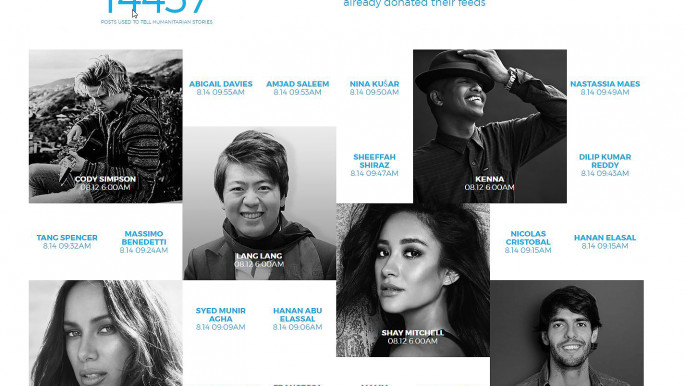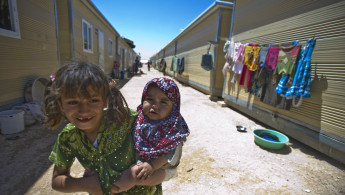#ShareHumanity campaign aims to empower the voiceless
Millions of people are “donating” their social media accounts in a new campaign that aims to highlight humanitarian crises around the world.
From Syria and Afghanistan to South Sudan, Nepal and Sierra Leone, the #ShareHumanity campaign allows individuals to drastically change their social media feeds and share captivating tales of humanitarian heroism.
Launched by the United Nations relief arm, ahead of this year's World Humanitarian Day on August 19, it aims to spur effort "to create a mass core of support for humanitarian life-saving action in the world today".
“Young people often ask me what they can do to help and I believe we have a shared responsibility to raise awareness and to help inspire humanity on these global issues,” Stephen O'Brien, the head of the UN Office for the Coordination of Humanitarian Affairs (OCHA) said.
“We're calling on the young and digitally-connected to help us push out these compelling stories and give a voice to the voiceless,” O'Brien added.
The online campaign has already captured the endorsements of numerous international celebrities and newsmakers from around the world, including Australian singer Cody Simpson, Chinese martial artist Jet Li, British media mogul Richard Branson and Brazilian footballer Kaká.
 |
|
A global crisis
The launch of #ShareHumanity comes at a particularly critical time for relief efforts around the world amid proliferating crises and funding shortfalls.
The UN has previously noted that in 2015 alone, some 78 million people in 31 countries across the globe require urgent humanitarian assistance, in the form of shelter, health care, education and food, at a cost $16.4 billion.
Funds, however, are increasingly lacking and the intensity of violence facing humanitarian workers – from Yemen and Syria to South Sudan and Iraq – is progressively hampering critical aid efforts.
Kieran Dwyer, chief of communications for the UN Office for the Coordination of Humanitarian Affairs, said the UN humanitarian office needs $20 billion this year to keep 100 million people in need alive — double what it asked for in 2009 — and so far it's received less than 30 percent.
That means "a lot of lost lives because we don't have the aid to keep them alive," he said.
The UN hopes that people inspired by the stories of men, women and children "who have hit the worst days of their life, and have come through them" will follow up by donating to the UN fund for global emergencies.
Stories of survival
The stories range from a circus school in Jordan for Syrian refugees teaching children skills like juggling and acrobatics to an organisation called Skateistan in Afghanistan that teaches Afghan girls and boys how to skateboard.
It also features a team of health works in South Sudan that defied conflict and flooding and walked on foot, crossing five rivers, to immunise youngsters against polio.
The campaign also shares gripping individual stories such as that of a 12-year-old Nigerian girl whose father was killed by Boko Haram extremists and who rescued her 10-year-old brother, left for dead in a makeshift grave after being attacked with a machete.
One of the most dramatic stories is Khaled Farah's rescue of a 10-day-old baby buried in rubble after a barrel bomb hit the family's apartment building in Syria's largest city, Aleppo, last year.
Farah, a former printer and decorator, is a member of the White Helmets volunteer group founded in March 2013 to help rescue fellow Syrians caught up in the war, which is now in its fifth year.
James Le Mesurier, director of Mayday Rescue which conceived the idea for the White Helmets and trains and supports them, said the organisation now has 2,700 volunteers in 110 rescue teams throughout the country and has saved 22,600 people.
However, 96 of its volunteers have been killed and about 400 have been injured and are unable to work, Mesurier added.
"What the White Helmets hope the campaign will do is to spread the message 'that in the most extraordinary of circumstances, there are ordinary, ordinary people doing the most extraordinary things," he said.
|
|
||



